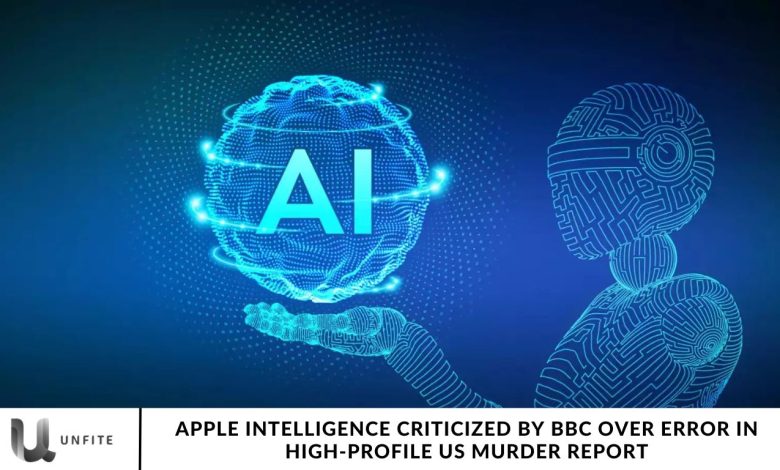Apple Intelligence Criticized by BBC Over Error in High-Profile US Murder Report

‘Luigi Mangione Shoots Himself,’ Raising Questions About the Company’s Accuracy
The alert, related to the murder case of healthcare CEO Brian Thompson, inaccurately reported that the accused, Luigi Mangione, had committed suicide. This error sparked criticism from the BBC, putting Apple Intelligence under scrutiny. In this blog, we’ll delve into how Apple Intelligence faced backlash from the BBC for this mistake in a high-profile US murder case.
Mistake in High-Profile US Murder Report by Apple Intelligence

Contrary to the false report, Luigi Mangione is currently in custody in Pennsylvania, USA, and will be transferred to New York for trial. The AI-generated notification incorrectly used the name of the media house, BBC, leading to accusations against Apple.
A BBC spokesperson addressed the issue, emphasizing that the BBC is a trusted news source and values the trust of its audience. The spokesperson expressed concern that even an erroneous notification bearing their name would damage their credibility, showcasing the false information in question.
Apple has yet to release an official statement on the matter. This is not the first time AI-powered notifications have been inaccurate. Previous incidents include false reports about Bashar Al Assad’s regime in Syria and South Korean President Yoon Suk Yeol, with Apple’s AI also misattributing news to other media outlets.
AI-powered notification summary feature on iPhones
Apple introduced the notification summary feature, which is designed to help users manage their notifications by prioritizing important alerts and reducing clutter.
This feature is available on devices running iOS 18.1 or later, including the iPhone 15 Pro, Pro Max, and iPhone 16 models. It is also supported on select iPads and Macs.
BBC’s Response to Apple Intelligence’s Error

BBC’s Public Statement: Overview of BBC’s Criticism Regarding the Error and Its Impact on Their Credibility
The BBC was quick to respond to the error made by Apple Intelligence, which was a false report about Luigi.
Mangione’s suicide was attributed to their name. The BBC’s spokesperson emphasized that the use of their trusted brand in connection with a misinformation error was highly problematic. As a respected global news organization, BBC’s credibility is integral to its identity, and any false report under its banner could have lasting consequences for its reputation. The statement underlined that even though the notification came from an AI system, the tech company ultimately has the responsibility to ensure accuracy in such sensitive matters.
Importance of Trust in Journalism: Why the BBC Emphasized the Importance of Trust in Media and the Damage Caused by AI-Driven Misinformation
The BBC highlighted the central role trust plays in journalism, especially when it comes to delivering accurate and reliable information. In an era where misinformation can spread quickly, media outlets like the BBC strive to uphold the highest standards of factual reporting. The BBC’s statement stressed that such errors, even when originating from an AI system, damage the trust they have built with their audience over decades. For the BBC, being associated with AI-driven misinformation erodes the trust people place in their reporting, potentially leading to a loss of credibility. With AI increasingly being used to generate news alerts, ensuring the information provided is accurate is more critical than ever.
Example of the Incorrect Notification: Displaying the Inaccurate Notification and the Fallout from It
The erroneous notification that sparked the controversy read: “Luigi Mangione shoots himself”—a claim that was not only false but also seriously misleading. The notification suggested that Mangione, who is under custody in Pennsylvania, had taken his own life. However, the reality was that Mangione was alive and awaiting trial in New York. The use of BBC’s name in the notification further amplified the mistake.
The fallout from this error was significant. Users who received the notification were misinformed, and the BBC was left to publicly distance itself from the mistake. In the context of such a high-profile case, the inaccurate alert raised concerns about the reliability of AI-powered news systems, and the BBC’s public criticism underscored the severity of the situation. The incident not only damaged the BBC’s reputation but also highlighted the potential dangers of using AI for news dissemination without adequate oversight and fact-checking measures in place.
Frequently Asked Question
What caused the criticism of Apple Intelligence by the BBC?
The BBC criticized Apple Intelligence for an error in a notification alert about Luigi Mangione, which falsely reported his suicide. The notification, attributed to the BBC, misrepresented the facts regarding a high-profile US murder case involving healthcare CEO Brian Thompson.
What was the mistake in the Apple Intelligence notification?
The error involved a notification that incorrectly stated, “Luigi Mangione shoots himself.” In reality, Mangione is in custody in Pennsylvania and has not committed suicide. The notification was a false and misleading report attributed to the BBC.
How did the BBC respond to the error?
The BBC issued a public statement condemning the misinformation. They emphasized that the use of their name in an erroneous report undermined their credibility and stressed the importance of trust in journalism, mainly when misinformation spreads through AI-generated notifications.
Was the notification really from the BBC?
No. Apple Intelligence’s AI system incorrectly attributed the notification to the BBC, despite the BBC’s not being involved in the original report. This error raised concerns about the accuracy and reliability of AI-powered news alerts.
Why is trust necessary for the BBC in this context?
The BBC has built its reputation on delivering accurate and reliable news. The use of its name in a false notification jeopardized its credibility and eroded trust with its audience, which is essential for any trusted news organization.
Has Apple responded to the BBC’s criticism?
As of now, Apple has not issued an official response to the BBC’s criticism. This lack of comment has raised further questions about the company’s accountability for AI errors in its notification system.
What other incidents of AI errors have been reported by Apple Intelligence?
Apple Intelligence has faced criticism in the past for inaccurate AI-generated notifications, including false reports about political figures like Bashar Al Assad and South Korean President Yoon Suk Yeol. These errors highlight ongoing concerns about the reliability of AI in news reporting.
Conclusion
The incident involving Apple Intelligence’s inaccurate notification about Luigi Mangione has raised significant concerns about the reliability of AI-driven news systems. The erroneous report, falsely attributed to the BBC, not only misled users but also jeopardized the BBC’s hard-earned credibility. With the BBC emphasizing the importance of trust in journalism, this controversy highlights the potential risks of using AI in news dissemination without proper checks and balances.
While AI technologies have the potential to revolutionize news delivery, incidents like this underscore the need for increased accuracy and accountability. Apple Intelligence must address these issues to regain public trust and ensure that future notifications are based on verified information. This event serves as a reminder that, in the digital age, even AI-powered systems must adhere to the highest standards of reliability and integrity.




